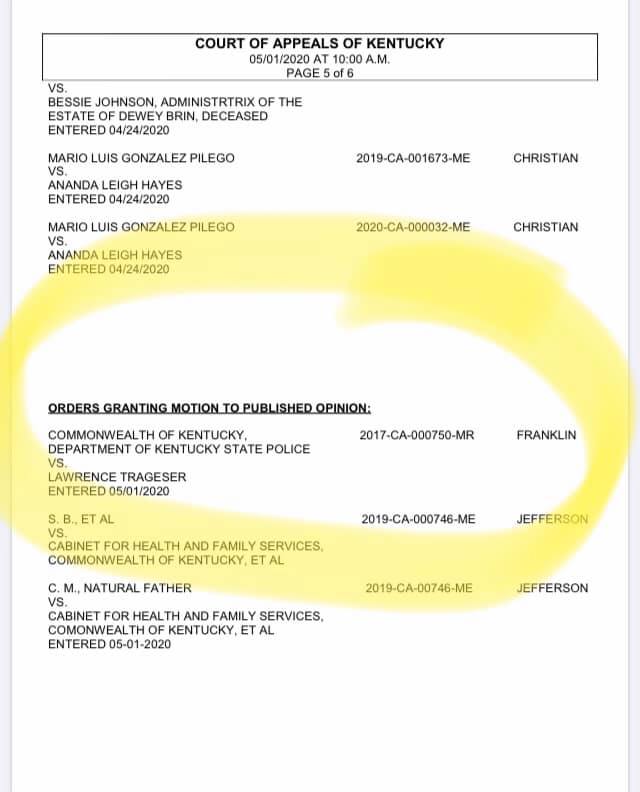
More welcomed news from the courts.
Today, the Court of Appeals granted Lawrence Trageser's motion to change the status of an opinion — affirming his right of access to trooper misconduct investigative files maintained by the Kentucky State Police — from unpublished to published.
http://opinions.kycourts.net/COA/2017-CA-000750.pdf
Trageser permitted the Kentucky Open Government Coalition to assist him in drafting his motion to the Court of Appeals. We were delighted to oblige.
The Court of Appeals originally designated the opinion "Not To Be Published." Under a rule of procedure, this meant the opinion —which reaffirms four decades of opinions limiting the scope of the preliminary documents exceptions to the open records law — could not be cited as precedent in any Kentucky court.
With the change in designation to "To Be Published," the opinion joins the line of authority recognizing that investigative records that were at one time preliminary and inaccessible to the public, forfeit protection when final action — including the decision not to act — is taken.
Reaffirming this position — which dates back to the early eighties and has been affirmed by the Kentucky Supreme Court but consistently ignored by KSP — in a *2020 published opinion* is tremendously important.
Now there is current authority that can and should be cited as legal precedent in all cases involving access to investigative records relating to public employee misconduct — including but not limited to local law enforcement and state troopers.
No more excuses for "misremembering" this well-established legal authority.
As we wrote in our March 27 post about the unpublished opinion favoring Trageser's, and the public's, right of access:
"In Kentucky State Police v
Lawrence Trageser, the Kentucky Court of Appeals reaffirmed long-standing precedent on the public's right of access to the underlying files compiled by a law enforcement agency in its investigation into allegations of misconduct leveled against police officers.
http://opinions.kycourts.net/coa/2017-CA-000750.pdf
The precedent affirmed in KSP v Trageser is nearly as old as the open records law itself. It is a precedent that public agencies, particularly law enforcement agencies and especially the Kentucky State Police, have ignored for many years.
In the early eighties, the courts recognized that, in cases involving public employee misconduct, the public must be given access to the complaint and final disciplinary action taken (including the decision to take no action).
https://casetext.com/case/city-of-louisville-v-courier-journal-etc
https://casetext.com/case/kentucky-st-bd-of-med-v-courier-journal
Critical to today's opinion, the courts also held that the public must be given notes or recommendation adopted by the Commissioner of KSP (or the equivalent ultimate decision maker in any other public agency) 'as part of his final action.' Once final action is taken, the courts concluded, 'the preliminary characterization is lost to that extent.'
The Court today affirmed established legal precedent — on which both the Kentucky Attorney General and the Franklin Circuit Court relied — in ruling against KSP and in favor of Trageser's, and the public's, right to those investigatory notes and recommendations in the underlying investigation file adopted by the agency in imposing discipline or not imposing discipline.
The public policy supporting this holding is clear: the public must have access to the complaint (to identify the allegations of misconduct) and the final disciplinary action taken (to assess whether the 'punishment fit the 'crime').
But the public must also have access to the investigative records confirming a thorough, fair, and unbiased investigation.
"The court also 'reject[ed] KSP's argument [that] KRS 61.878(1)(a) exempts from public disclosure the entirety' of an investigative file.
"KRS 61.878(1)(a), the privacy exception to the open records law, has never been interpreted to authorize nondisclosure of records relating to public employee misconduct.
"The court today reaffirmed that some personal information (the public disclosure of which would constitute a clearly unwarranted invasion of personal privacy) could be masked. The court determined that 'social security numbers, driver's license numbers, home addresses, and phone numbers' could be redacted *but not the entire file.*
"The public policy supporting this holding is equally clear: Public service is a public trust and public servants who breach that trust forfeit, to some extent, their privacy rights.
"The public interest in confirming that the public agency properly discharged its duty to investigate, and take appropriate disciplinary action, outweighs any privacy interest that are implicated.
. . .
"The noose is tightening on agency abuse of the preliminary documents exceptions."
Additionally, on March 27 we asserted that "[n]ot a single dime of taxpayer money should, in our view, be spent pursuing this case any further."
Although KSP has the option of petitioning the Kentucky Supreme Court for discretionary review, we believe that no further efforts to resist disclosure of these records — which Trageser first requested in 2015 — should be expended.



